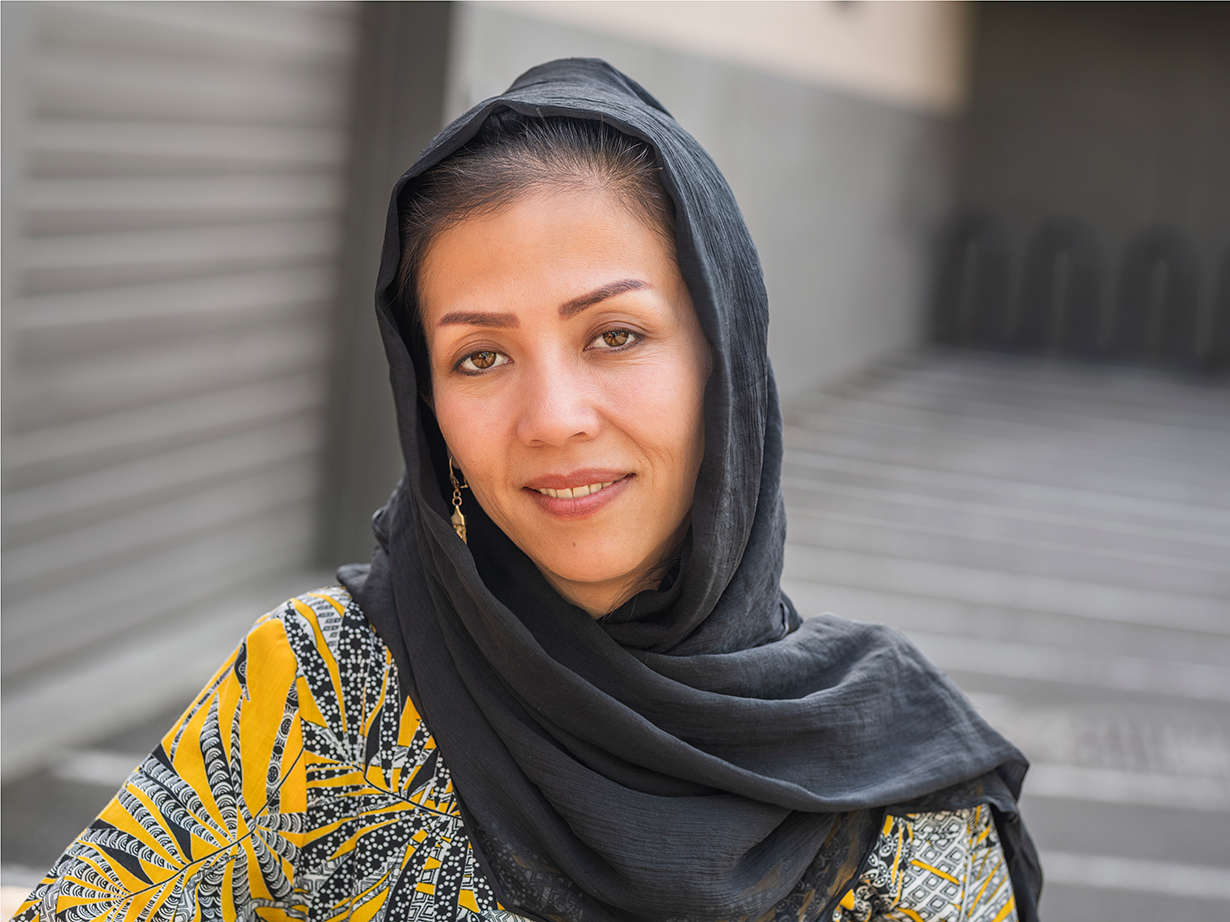In the vastness of the skies above, where dreams take flight, sits Safia Ferozi, the second woman to ever become an Air Force pilot in Afghanistan. She is leading a squadron of 200 planes. She is busy thinking about the task at hand — not about being a woman in a surprising place in her country.
Ferozi was born in Wardak Province, Afghanistan, in 1991. She is Hazara, a member of one of Afghanistan’s largest ethnic minorities. The second of six daughters, she spent much of her childhood helping with household chores and contributing to the family income by making carpets. The Taliban did not allow girls to attend school.
After the Taliban regime began closing roads and restricting traffic, no food shipments could get through to the village. To avoid the famine that erupted, Ferozi’s family made the decision to flee to Kabul in search of better living conditions.
While Kabul was only a four-hour drive away, it was one week on foot.
“We walked in the mountains, night and day for one week,” Ferozi says. “I remember my mom would just eat a little, just enough to survive. I knew she was not really OK, but just trying to provide all the food she could manage for our big family, even when we had hardly anything.”
While the family continued to face discrimination in Kabul as Hazara, they could at least now find food, and Ferozi and her sisters continued to make carpets at home to help support the family.
Following the collapse of the Taliban government in 2001, Ferozi’s older sister was able to persuade their father to allow his daughters to go to school.
“My sister says, ‘Dad, it’s OK. We will work during the night, and during the day, we will go to school,’” she says.
From then on, the sisters attended a local school, where Ferozi dreamed of becoming a doctor. However, this ambition shifted one day when she saw a TV commercial featuring female pilots in the military.
“One day I will become a pilot,” Ferozi said to herself.
After she graduated from high school, she and her sister persuaded their father to let them enroll in the military. After he visited the army facilities where they were stationed, he felt reassured about their safety and encouraged all his other daughters to pursue the careers they wanted.
By 2021, Ferozi had married a fellow pilot, Mohammad. She had also become first lieutenant colonel and was leading a squadron of 200 pilots.
Still, the pervasive dangers that women pilots faced remained. Ferozi describes an incident at the American base: One day a soldier came to her office to warn Ferozi and her female colleagues of an imminent threat — a terrorist group outside aiming shots at their windows.
“We heard someone knock on our door, ” she says. “Then suddenly an American soldier broke down the door and yelled, ‘Lie down, lie down!’”
While none of her colleagues were fatally injured, the attack demonstrated that even at the American base threats for their safety as women pilots were prevalent.
Back at the Afghan base, the fear lingered. To maximize their safety after that incident, the women always cooked and ate together in their room, with a guard stationed outside the door in case of a threat.
Despite the challenges, Ferozi emphasizes her feelings of self-confidence: “I am the same as a man; my work is not different.”
By August 15, 2021, Ferozi was pregnant with her second child and still working at the base each day commanding her squadron. That day was strangely quiet at the base. At noon, her mother called saying that the Taliban had entered Kabul. By early afternoon, they got word that the president of Afghanistan, Ashraf Ghani, had fled the country. Ferozi tried to call her commander but nobody answered.
The pilots were now in great danger. They and their extended families would become prime targets for the Taliban because of their cooperation with the U.S. troops. In fear for their lives, the pilots began to consider a flyout using their aircraft. At 4 p.m., they made the decision to fly to neighboring countries, such as Tajikistan or Uzbekistan. But Ferozi and Mohammad could not make the journey with them; Ferozi’s pregnancy and their young daughter prevented it.
With the help of Ferozi’s American adviser, the family boarded a commercial flight to Qatar that night.
“I couldn’t say goodbye to my parents,” Ferozi says. “I saw them standing really far away, but I could not say, ‘Goodbye Mom, goodbye Dad.’ I was leaving the country, and I couldn’t even say goodbye.”
A week after landing in Qatar, Ferozi gave birth to her second daughter. A short time later, the family moved to Salem, Oregon. Ferozi now works as a native language community school outreach coordinator at the Salem-Keizer School District assisting Afghan students and families. Between her full-time job and advocating for her family who are stuck in Afghanistan, she has decided to wait on returning to pilot training.
“I am physically here but mentally in Afghanistan,” she says. She explains that her military background has made the rest of her family a target for the Taliban, forcing her remaining family members into hiding. Her priority now is earning money to support her family in both Afghanistan and the U.S. Several of her siblings have made it to the U.S., but she remains dedicated to reuniting with the ones left behind.
“I want to see them again,” she explains. “So anything I can do to help them, I will do it.”


One thought on “Opening Doors for Others”
Thank you for your informative and inspirational story. You teach us stay in hope, and not give up. I hope conditions have improved for your family in Afghanistan, and that you have found peace and safety in Oregon.
Comments are closed.